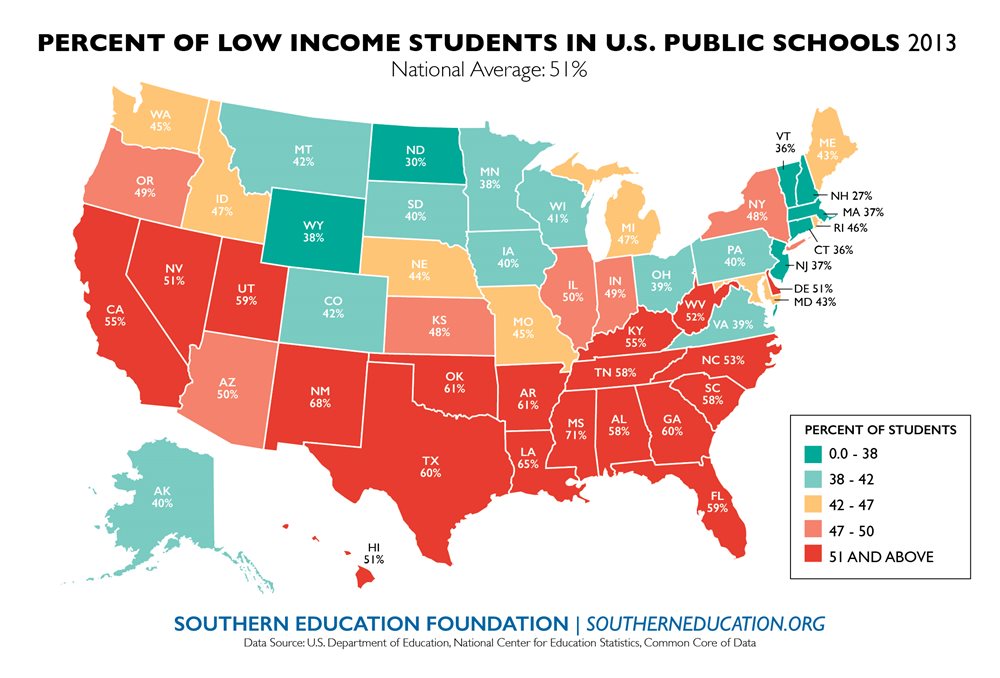Student Poverty is the Dominant New Reality

In 2015, there was news that the middle class was shrinking and that 51% of students (the new majority) receive free and reduced lunch. Research also shows that children from poverty have brains that are wired differently than those from middle class families - they show less area dedicated to skills like impulse control, reasoning, memory, attention and vocabulary/grammar. These results do not imply that a child’s future cognitive or brain development is predetermined by socioeconomic circumstances, the researchers said, but show areas of needed development. This likely comes as no surprise to you as an educator.
and that 51% of students (the new majority) receive free and reduced lunch. Research also shows that children from poverty have brains that are wired differently than those from middle class families - they show less area dedicated to skills like impulse control, reasoning, memory, attention and vocabulary/grammar. These results do not imply that a child’s future cognitive or brain development is predetermined by socioeconomic circumstances, the researchers said, but show areas of needed development. This likely comes as no surprise to you as an educator.
Suitts, Steve. A New Majority Research Bulletin: Low Income Students Now a Majority in the Nation's Public Schools. Southern Education Foundation. (2015).
There Are Many Ways that Family Income Affects Children Neurologically:
- Children raised in poverty are exposed to millions of fewer spoken words at home. Going back to the groundbreaking Hart & Risley study in 1995, we know that children in lower income homes are exposed to as many as 30 million fewer words than those from middle-class families.
- Weaknesses in oral language can lead to significant reading gaps. This impacts the child’s ability to establish distinct phoneme representation, build vocabulary, and develop age-appropriate oral language skills.
- Low-income level can negatively impact cognitive functions. Many children in low-income households are limited in various cognitive areas, such as long term and working memory, visual and spatial skills, and executive functions.
- Family income is linked to memory and attention. Recently, Kimberly Noble and Elizabeth Sowell have found compelling links between family income and brain structure – especially affecting areas of the brain important for memory and attention.
Fast ForWord Targets the Areas of the Brain Impacted by Poverty
But here's what is surprising: a computer-based program developed by neuroscientists has been shown to improve these skills, and to improve them quickly. It's called Fast ForWord, and when done just 30 minutes/day, 3-5 days a week, it can have fast and lasting effects on reading comprehension, attention, memory and much more. In addition, Reading Assistant Plus can boost student’s print exposure, which helps compensate for reduced exposure to verbal language and print at home.
Read about the inspiring results at Highland View Elementary School, Hattie Watts Elementary School, Murray County and J.S. Aucoin Elementary School.
View more resources on poverty in education
Further Reading on Poverty in Education:
- Public education's biggest problem keeps getting worse by The Washington Post
- Using Brain Science to Design New Pathways out of Poverty by Crittenton Women's Union
- How Poverty Affects School Success by SmartBlog on Education
- Closing the achievement gap in a high-poverty school by SmartBlog on Education
 Researched at Top Universities
Researched at Top Universities
- Fast ForWord is the only reading intervention that has been substantiated by research at Rutgers, Stanford, Harvard, MIT, Cornell, etc.
- Students can make up to 2 years’ gain in 3 months in reading and language skills
We're With You Every Step of the Way!
- Flexible implementation models (small group, whole class, whole school, district wide)
- Varied options for services and training: web-based, onsite, or a combination
- Frequent “check-ins” to ensure you and your students are getting the most from your investment
Making a Difference Every Day
Over 8500 schools and 2 million students have used Fast ForWord and Reading Assistant Plus products.





